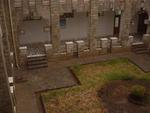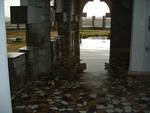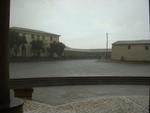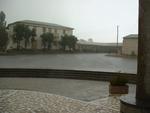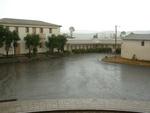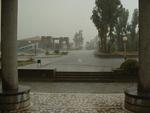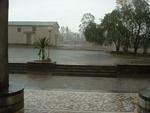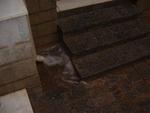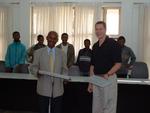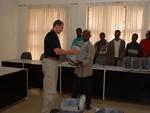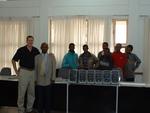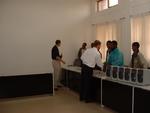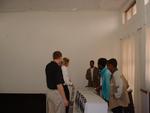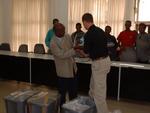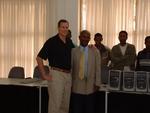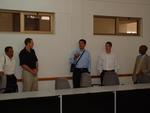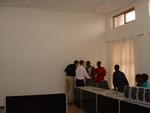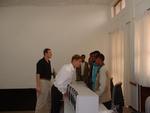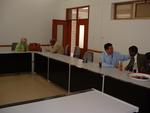Regardless of what you might or might not have heard, northern Ethiopia is
still suffering from drought. In the south of the country, the world service
has told me that there has been flooding. That is not true here, yet.
This week has been pretty good for rain. We have had at least a small amount
of rain each day. This is when the 'big rains' should be starting. When it has
looked like it might start raining, I have been going outside and calling
the clouds 'great girls blouses' for not releasing enough water. Of course,
it doesn't work because i'm not saying it in Tigrinian, but it makes me
feel better.
However, Friday was different. Very different. The afternoon saw some dark clouds
approach, and the rumble of thunder coupled with the distant flash of
lightening. The clouds looked no darker or more menacing than any other day.
However, they had brought friends, lots of friends. Friends called 'torrent',
'downpour', 'cats and dogs', and for a lack of a thesaurus 'lots of water'.
It rained hard for over an hour. Looking over the plain outside MIT I
could see sheets of water falling onto the now visibly greener grass (the
rest of the week had been kind to the grass). I wouldn't see the full extent
of the water until I went home.
When it came time to go home, I was a little bit confused why Dr Mulu, my
boss, had decided to take the regular servees vehicle, a pickup. His
car was parked at MIT and I think it was working on the day (a bit hit
and miss at the moment).
As we left MIT it became clear how much water had fallen in a short time.
On the corner outside, people were skirting around a very large puddle barefoot.
Presumably they were barefoot to stop water getting in their shoes. In the UK
there is a law that says that you cannot splash people when you are driving in
your car. I think it is due care and attention, but I don't know. This isn't
a law here. I must admit that I couldn't stop myself from smiling as children
were scrambling to get further than then 10 feet or so that water was spraying
from the wheels of the car. I justified it to myself by thinking that these
are the same children that say 'You You' and 'Money Money'. Maybe they were,
maybe I was just feeling sadistic. I enjoyed it though.
By the side of the road a small river had formed in a place that there wouldn't
normally be a river. In fact, the whole road was a very shallow river. Up
ahead, we approached a point that I had always assumed was a small bridge over a dry
river. Two line taxis were either waiting or had stalled or broken down in some
other way. The line taxis where either side of a very fast moving flow of water.
It approached from in front and to the right, and disappeared to the left. The
bridge was not a bridge at all. The water flowed over it. It was the road made
into concrete for just this small patch. Obviously, this is where water normally
flowed, and the protection was needed. Looking back, it should have been so
obvious that this is how it was used, but I had just assumed 'bridge'.
We crossed the water, the pickup being better equiped to do this than the line
taxis which are nothing more than small mini-buses. As we drove out of the water,
we could see the source of the water. Fast moving, and a dirty orange colour.
It gave the appearance of a stair case with very wide flat steps as it cut into
the soil. By the morning it would be gone. Such a heavy downpour has probably not
done much for farming. However, I hope that it has gone part of the way to providing
us with some electricity. Although, having said, that I am typing by candle light
on Sunday. This is not normally a mabrat yellem day.
Since writing that last sentence, I went to the toilet and the lights are back. Lets
see how long they last. I have got a good supply of candles and matches just in
case.
I had a visit during the week from some members of TDA in Addis. They were asking
if I could help them to provide a list of equipment for the building in Addis.
They wanted to arrange a meeting but I told them that it would not be possible
because I don't really have time. We spent some time going over what was necessary
but it seems that they wish to get an exact list of equipment. I told them to come
back on Monday at 13:00. They were already a little bit put out that I had tried
to do it on the day. 13:00 on Monday was too early - their lunch was 12:00
until 13:30. I explained politely how much lunch I normally get, and I told them
to take it or leave it. Not the politest of things, but then asking for something
like this is not good etiquette. They should pay someone in Addis to do it.
Saturday was a big day for staff and students at MIT. Some of the board of MIT
visited, along with some other guests. Some of these guests had some computers
to donate. This is great - six new computers. A 'ceremony' was held in the
morning where the students received the computers and many photos were taken.
The doners kept asking me how powerful the computers were. Were they Pentium
3s or 4s. I didn't have the heart to tell them that they were Celerons and
really nothing special. However, they are sufficient for using in a lab,
and this of course means more work for me. I want to get them set up and in
use by the end of the week, but that is quite ambitious. However, the students
need to practice in the last 4 weeks of term. The computers were supplied without
monitors, but I was told that some were bought and should be here by
Tuesday. We'll see. I have a back up plan - i'm still not Habesha.
Once the guests had left (the board would be back for a meeting with the
students in the afternoon). I set up trying to put network cable in
for a new lab of six computers. I was able to use the students to
help create the cable. Yes it takes longer this way, but they get
some practical experience. Something that it is hard to get in
Ethiopia.
In the afternoon, the guests were back. This time the Indians who had created the
draft curriculum were back. This was to be a meeting for the students. Partly
to announce that of the three original planned schools (Electronics, Computing
and Civil Engineering), Civil Engineering would not be going ahead next year.
This means that some of the students would not be able to do their choice.
(Un)fortunately I was told by Ato. Hagos that nearly all of the students want
to do computing at the moment. I am trying to persuade them to think of what it
will be like when they don't have a VSO teaching computing, and that they will
have a VSO for Electronics next year. Doesn't seem to have worked though.
The meeting was in Tigrinian and in English when the Indians spoke. Again, I found
it hard to follow what was said by the Indians so I don't know how the
students found it. I couldn't understand any of the Tigrinian so I was sitting
there for nearly three hours with not much to do. The Indians were trying
to explain what was involved for the courses that they had created. Their
bias was abundantly clear. They are still skewed towards Electronics. I
particularly liked the argument that because computers need electricity to work,
Computing should be part of Electronics. (Un)fortunately I wasn't invited to
speak at this meeting. Probably just as well I was muzzled. In the UK I think I
would have started the argument that Demolition Work is under the category
of Home Economics, because you need to eat to do it.
After the meeting, I was able to show the people from board things like the
labs. I mentioned that I was training members of staff, and using the
lab attendants. They seemed quite happy but did have some suggestions which
don't really seem practical given timescales, so I politely explained this.
One of the men, Ato Araya, is very well respected throughout Tigray. He has been
trying to arrange a meeting so that we can chat about things. I need this as well
because of some business initiatives that I feel MIT needs to be starting.
They also got to see the Electronics lab where the Indians presented what looked
like three components (but I assume it was more). Once again, the students
were in awe, but had to ask me what they were. This was just like the machine
that went bing part II.
I was able to suggest some ideas to the board, but I held back on most of them so
that I can actually prepare a proposal. One did get excited when I said about
a programming competition. I believe that our students after a year will be
able to beat the equivalent students at Addis in an externally judged
competition. It is one way that we might get our name known. I know that I can
train them to international standards and get them ready for a 'fight'.
This entry sounds so confrontational doesn't it? Addis is good at theory,
but I think we can definitely beat them on practical skills.
I have spent my Sunday afternoon working on the curriculum for a meeting this
week. This also means that, once again, I will be preparing for a lecture
at 11:00 when I arrive in the morning. Three hours to write a lecture
and the lab sheets. I have pulled it off so far, but that just shows how
tight the time is here. If there is no power, then I have problems. I will
have to bluff the lecture.
On a slightly different note, my tap has broken. The flexible pipe leading to
it has corroded and it came off today. Previously I have wondered why there
are two taps. One in the wall, where the flexible pipe comes from and the
tap on the sink. This design is repeated throughout Ethiopia (or what I
have seen anyway). Again, I understand now, and am very grateful for that
other tap. I can stop water going everywhere but still be able to have
a shower. This is just proof, that things are not always what they are
seem in a different culture, taps are not redundant, and bridges
might not be bridges.
